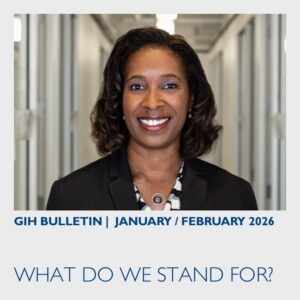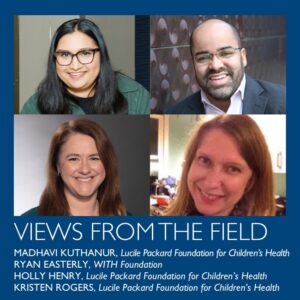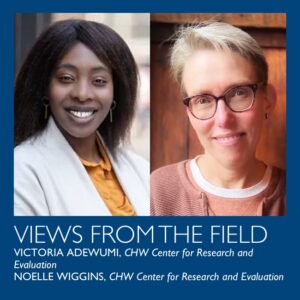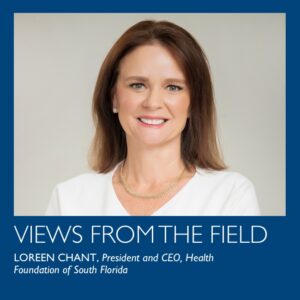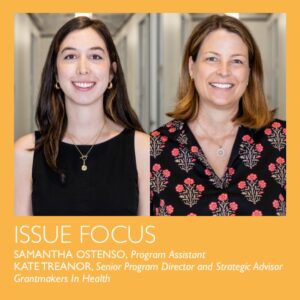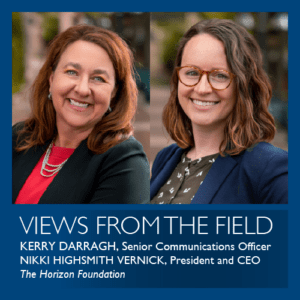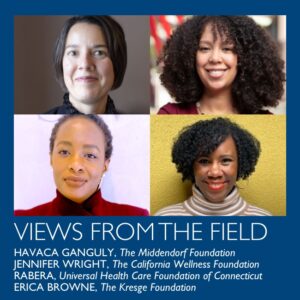GIH Bulletin: November/December 2024
One in five children in the United States has a special health care need requiring more than routine health services, and one in four adults report having a disability. As 70 million adults and 14.5 million children in the United States have a disability, the population impacted by issues in the aging out process and in the health care system more broadly is far from insignificant. Despite these numbers, disability-related grants represent just 2 percent of total philanthropic giving and are primarily directed towards services and supports that seek to fix or cure disabilities and perpetuate the ableist assumption that people with disabilities are unable to make decisions about their own care.
GIH Bulletin: October 2024
Community Health Workers (CHWs)—frontline public health professionals who have a unique and trusted relationship with the communities they serve—have proven their ability to help create just, equitable, and thriving communities. As a CHW for over a decade and a CHW ally for over 35 years, we have never witnessed a time of greater interest and investment in the CHW workforce. Amidst a rapidly changing CHW funding landscape, the philanthropic community has an important role to play in assuring that CHWs are able to make an optimum contribution to communities and to the health system.
GIH Bulletin: September 2024
When basic social needs go unmet, they become the principal drivers of health disparities. Recognizing this, the Health Foundation of South Florida has been advancing a collaborative approach that brings together health systems and community-based organizations and paves the way for implementing promising social interventions. Through this approach, the Health Foundation seeks to drive improved health outcomes and greater coordination to address unmet health-related social needs within clinical care settings.
GIH Bulletin: August 2024
Each year, more than two million low-income, uninsured, and underinsured people in the United States rely on approximately 1,400 nonprofit free and charitable clinics and charitable pharmacies for essential health care. These clinics use a volunteer/staff model to provide a wide range of health services including medical, dental, pharmacy, vision, and behavioral health services. Many clinics also address social needs, such as connecting patients to housing, food assistance, or employment assistance programs.
GIH Bulletin: July 2024
In an era marked by profound societal divisions, the role of local media in fostering democratic health stands as a cornerstone of informed civic engagement. From critical issues like health care and housing to economic opportunity and climate impacts, local journalism is the bedrock upon which communities build their understanding and response. Yet, the field faces challenges beyond the well-documented financial crisis facing local newsrooms, encompassing deep-rooted inequities in newsroom composition and the narratives they convey.
GIH Bulletin: May/June 2024
In 1965, the Older Americans Act was a beacon of successful bipartisan legislation to address the social, economic and health needs of older Americans on a national level. Nearly 60 years later, the act has changed little, yet life for older adults and what it takes for them to thrive has changed significantly. This fall, the act is up for reauthorization — providing Congress an opportunity to give it a long overdue modernization to ensure it can meet the needs of older Americans today.
GIH Bulletin: April 2024
In 2019, MacKenzie Scott announced that she was stepping into the world of philanthropy to give away her multi-billion-dollar fortune “until the safe is empty.” She has kept her word—to date, she has given away $16.5 billion. Her initial process for choosing which organizations would receive grants was shrouded in mystery. From 2019 to 2023, Scott used a process she termed “quiet research” to identify possible grantee organizations. The lucky organizations received a call from Scott’s consultants, who let them know they were receiving a grant for immediate use however they would like to spend it. In the Fall of 2022, Grantmakers In Health (GIH) became one of those grantee organizations, along with more than 20 health foundations. Two additional GIH Funding Partner organizations received gifts in 2020 and 2021, respectively.
GIH Bulletin: March 2024
The Horizon Foundation of Howard County, Maryland believes that everyone in our community deserves to live abundant and healthy lives. But there are barriers standing in the way of some of our residents—particularly people of color—from achieving that vision. We know that for too long, inequitable laws, policies, and practices have held back many of our neighbors. The foundation recently completed a 14-month long strategic planning process to figure out how to address these systemic barriers in a way that centers the voices of our community members who are most impacted. We realized that our work—what we focus on, who we engage with, and how we make decisions—needed to fundamentally change.
GIH Bulletin: January/February 2024
Trends in leadership are changing — just take the Terrance Keenan Institute as an example. When the program started in 2010, it focused on general leadership tactics with topics that ranged from leveraging resources and building partnerships to board dynamics. Since then, the Institute’s curriculum has moved towards a recognition that leaders possess individual strengths that can be embraced to make our organizations and the broader field of health philanthropy more effective.

